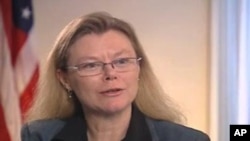The international body tasked with creation and coordination of a system to "take the pulse" of the planet convenes this week in China. The Group on Earth Observations, or GEO, holds its Seventh Plenary Session ahead of a Ministerial Summit November 3rd to 5th in Beijing.
The meeting will mark the half-way point in a 10-year implementation plan to create what is called the Global Earth Observation System of Systems, or GEOSS. GEO includes 85 governments, the European Commission and 58 intergovernmental and international organizations.
"Think back to when, in the 19th century the Farmer's Almanac was started," said Sherburne or "Shere" Abbott, who directs environment and energy programs at the White House office that oversees U.S. Science and Technology Policy. Ms. Abbott, who is co-chair of the Seventh Plenary Session of GEO, says GEOSS will serve similar needs on a much more comprehensive level:
"We are trying to build, from the bottom up, a system in which we understand from the amalgamation of a wide variety of environmental observations, from satellites, from aircraft, from buoys, from ships, from ground use, from storm gauges, all of these things into one system, a system of systems in which we can develop an integrated look at the way the earth is changing, how humans are changing in response to environmental change, and how they interact together."
The information gathered through GEOSS will help predict everything from climate change and biodiversity loss to floods, forest fires and public health threats.
"If you imagine a world in which you can share information about the oceans, about ocean color, about temperature of the oceans, and overlay that with information about public health communities … for example, if you could predict cholera outbreaks using environmental data and health data, that would be hugely advantageous to societies as they plan for the future."
International and cross-sector data sharing is a key topic of discussion at the meetings. U.S. President Barack Obama’s administration plans to unveil two new initiatives, including a program designed to strengthen global capacity to monitor and manage forest and terrestrial carbon and another program that will paint a more comprehensive picture of global land use.
Ms. Abbot said that U.S. involvement in GEO is another example of President Barack Obama’s administration's commitment to data sharing, international scientific cooperation, and combating climate change.
Cooperating On Earth Observation

The international body tasked with creation and coordination of a system to "take the pulse" of the planet convenes this week in China.





















